Saffron Dreams was declared a finalist in the multicultural category by the 2009 Indie Book Awards. The Indie Book Awards were established to recognize and honor the top independently published books of the year. IBPPG was formed in 2005 to provide support and recognition for the independent book publishing profession.
Kamila Shamsie: Born into a family of writers
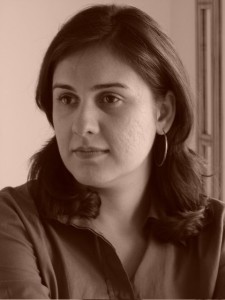 Kamila Shamsie is the author of five novels, including Kartography, Broken Verses and Burnt Shadows, which have publishers in 19 countries. Three of her novels have received awards from the Pakistan Academy of Letters and she has been shortlisted for the Liberaturpreis (Germany), twice for the John Llewellyn Rhys award (U.K). She has written for various publications including The Guardian, Prospect, New Statesman, TLS, The Telegraph (all U.K), DAWN and Newsline (Pakistan), The Daily Star (Bangladesh) and the New York Times (U.S), and is on the editorial board of the Index on Censorship. She has been a judge for the Orange Award for New Writing, the Guardian First Book Award, the Geoffrey Faber Memorial Award and the Australia-Asia Literature Award. She grew up in Karachi, went to university in America and now lives in London. Burnt Shadows is shortlisted for the 2009 Orange Prize for Fiction.
Kamila Shamsie is the author of five novels, including Kartography, Broken Verses and Burnt Shadows, which have publishers in 19 countries. Three of her novels have received awards from the Pakistan Academy of Letters and she has been shortlisted for the Liberaturpreis (Germany), twice for the John Llewellyn Rhys award (U.K). She has written for various publications including The Guardian, Prospect, New Statesman, TLS, The Telegraph (all U.K), DAWN and Newsline (Pakistan), The Daily Star (Bangladesh) and the New York Times (U.S), and is on the editorial board of the Index on Censorship. She has been a judge for the Orange Award for New Writing, the Guardian First Book Award, the Geoffrey Faber Memorial Award and the Australia-Asia Literature Award. She grew up in Karachi, went to university in America and now lives in London. Burnt Shadows is shortlisted for the 2009 Orange Prize for Fiction.
Author Interview
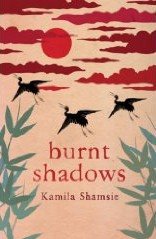 You have been writing for a long time. How would you describe the evolution of your style? What benefit did you get from being around a family of writers? Of all of your works, which one is the dearest to your heart?
You have been writing for a long time. How would you describe the evolution of your style? What benefit did you get from being around a family of writers? Of all of your works, which one is the dearest to your heart?
I’m the last person you should ask about the evolution of my style – aren’t writers notoriously poor at analysing their own work? For me each novel brings its particular set of stylistic demands – with Burnt Shadows’ for instance, because I was going to cover 60 years and 5 countries I knew I needed a more pared down style than in my earlier works.
Being around a family of writers means that I grew up encouraged to read, and surrounded by the notion that books mattered and should be taken seriously. And also, of course, that I had the idea that writing was simply something that people DID….so it never felt unusual that I was writing fiction in my free time all the way through my adolescence. I’ve always found that the novel I’m writing or have just finished is the one dearest to my heart, because that’s the one I feel most engaged with. So right now it’s Burnt Shadows. As soon as I get to work on the next novel, that will change.
What do you make of the rising interest in Pakistani writing in English today?
I’m primarily interested in the writing itself, rather than the interest in it – and I think the work is wonderful. Nadeem Aslam, Uzma Aslam Khan, Aamer Hussein, Mohammad Hanif, Mohsin Hamid and Daniyal Mueenuddin : that’s an extraordinary group of writers. So it is a very exciting moment for Pakistani writing in English. But the interest in it is unfortunately tied up in the world’s terror about what’s going on in Pakistan politically – and, of course, I wish that we didn’t have that situation.
Being on the shortlist for the Orange Fiction Prize is a great honor. How would you rate the competition?
I haven’t yet read the other books on the shortlist – but to think of someone like Marilynne Robinson as ‘competition’ is ludicrous. Her first novel Housekeeping is one of the finest novels of the 20th century. So I’m just enjoying the fact that I get to be in her company on this list.
Describe a day in the life of Kamila Shamsie. What is next for you?
Well, it depends on whether I’m writing or not. When I’m writing a typical day is – wake up, read the newspaper while have a morning cup of tea/coffee, then sit at my desk and start writing. Afternoons my brain shuts off so I might meet a friend for lunch, or go to the gym or read or waste time surfing the web…in the evenings, on a good day, I’ll do another 2-3 hours of work. And then I’ll often go out in the evenings with friends, though some days I just stay in, watch tv, read some more….and so the day goes.
The last few months I’ve been caught up in doing publicity for the book – it started in Pakistan in February, and I’ve just finished a US/Canada tour and have a two month break before going to Ireland and Australia in August, followed by Germany in September and so on…. so there’s no proper routine these days.
What advice do you have for aspiring authors, especially Pakistani writers?
Write.
That sounds facetious, I know, but it’s amazing to me how many people say they’ll write a novel ‘one day,’ or who get caught up in wanting to know about agents and publishers before they’ve written a book. Anyone who is serious about writing needs to make time to write – now, not in some abstract future. And just concentrate on writing the best book you can before worrying about how to get it published, or how it’ll be reviewed etc.
Links
Read an excerpt of Burnt Shadows
Buy Burnt Shadows
About the author
Muneeza Shamsie: An inspiring mother
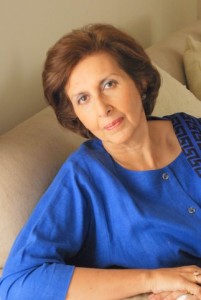 Muneeza Shamsie is a Pakistani critic, bibliographer, short story writer and the editor of three pioneering anthologies A Dragonfly In the Sun: An Anthology of Pakistani Writing in English (Oxford University Press, Karachi 1997) a retrospective of poetry, fiction and drama, Leaving Home: Towards A New Millenium: A Collection of English Prose by Pakistani Writers (Oxford University Press, Karachi, 2001) about migration; And The World Changed: Contemporary Stories by Pakistani Women (Women Unlimited, New Delhi 2005; Feminist Press, New York 2008). She was educated in England, has lived in Karachi and given much thought to issues of colonialism, culture, language and gender which she has addressed through her writing. She has spoken at many literary forums in Pakistan, Britain and India and written essays on literature for many publications such as The Oxford Companion of Pakistan History edited by Ayesha Jalal (forthcoming) the online Blackwell Encyclopedia of Twentieth Century World Fiction edited by John Ball (forthcoming). Interpreting Homes in South Asian Literature edited by Malashri Lal and Sukrita Paul Kumar (2007) The Encyclopedia of Pakistan edited by Hafeez Malik (2006) and South Asian Century edited by Zubeida Mustafa (2001) among others. She contributes to Dawn, Newsline, The Journal of Commonwealth Literature and the online Literary Encyclopedia. From 1973-82, she taught, as a volunteer, music and mime at a special education school run by ACELP and is a founder member of the Karachi hospital, The Kidney Centre.
Muneeza Shamsie is a Pakistani critic, bibliographer, short story writer and the editor of three pioneering anthologies A Dragonfly In the Sun: An Anthology of Pakistani Writing in English (Oxford University Press, Karachi 1997) a retrospective of poetry, fiction and drama, Leaving Home: Towards A New Millenium: A Collection of English Prose by Pakistani Writers (Oxford University Press, Karachi, 2001) about migration; And The World Changed: Contemporary Stories by Pakistani Women (Women Unlimited, New Delhi 2005; Feminist Press, New York 2008). She was educated in England, has lived in Karachi and given much thought to issues of colonialism, culture, language and gender which she has addressed through her writing. She has spoken at many literary forums in Pakistan, Britain and India and written essays on literature for many publications such as The Oxford Companion of Pakistan History edited by Ayesha Jalal (forthcoming) the online Blackwell Encyclopedia of Twentieth Century World Fiction edited by John Ball (forthcoming). Interpreting Homes in South Asian Literature edited by Malashri Lal and Sukrita Paul Kumar (2007) The Encyclopedia of Pakistan edited by Hafeez Malik (2006) and South Asian Century edited by Zubeida Mustafa (2001) among others. She contributes to Dawn, Newsline, The Journal of Commonwealth Literature and the online Literary Encyclopedia. From 1973-82, she taught, as a volunteer, music and mime at a special education school run by ACELP and is a founder member of the Karachi hospital, The Kidney Centre.
Author Interview
As a literary critic and writer, your focus has always been on Pakistani writers and Pakistani writing in English. What do you attribute to the rising interest of such literature in the West? Do you think that it is a phase that will eventually lose its spark?
I think the reason for the rising interest in Pakistani English fiction today is perfectly straightforward: that it has become increasingly accomplished and Pakistani English writers today are really good. This was not so in the earlier decades of Pakistan and, with the exception Ahmed Ali whose major novel was pre-Partition, it was really Zulfikar Ghose and Bapsi Sidhwa who changed that. This coincided with new literary discourse in western academia and the realization that some of the finest English Literature was coming from migrant communities in the west and Britain’s erstwhile colonies.
There is a great international awareness of Pakistan today because of political events and that too has generated an interest in writing from this country, but I don’t believe this would be of much worth, if it was not met by real talent. There are wonderful Pakistani English writers emerging daily – and many more waiting in the wings. To some extent it is a snowball effect. The success of fellow-compatriats encourages others in Pakistan. These established writers are invited to school and colleges in Pakistan; some have conducted creative writing workshops too.
Tell us about your experience as a writer, critic and journalist? How did you choose that path? What was your proudest moment?
My sister and I had a rather unusual upbringing for Pakistani girls because we were sent away to boarding school in England when we were very young – as my father and his brothers had been – when I was nine, my sister was eight. I came back home to Pakistan at nineteen.
I had always loved reading and writing, but it was merely something that people in my family just did. I never thought of it as a career. I had wanted to be a scientist, but I discovered there were no openings for women scientists in Pakistan. So there followed a long period of confusion and cultural conflict.
I was married at 24, of my own choice. I was encouraged to write by my husband, Saleem and my two best friends, although I kept it a secret from everyone else: it was years before I mustered up the courage to offer anything for publication. The next thing I knew, I was asked by Dawn to contribute features to its newly vamped Sunday Magazine. This was in 1982.
I loved journalism. I loved the new horizons it opened out for me (and it enabled me to work from home, because my two daughters, Saman and Kamila, were very young). I wrote on all sorts of things from art and archeology, to development and education. All the while the most important part of it, for me, was the engagement with literature which has always been my great passion. I interviewed and reviewed many contemporary writers, including Pakistanis. As a result I had a lot of material to draw on when Oxford University Press asked me to put together my first anthology A Dragonfly In The Sun a compilation of 50 years of Pakistani English writing for Pakistan’s Golden Jubilee.
Shortly after the anthology was published, the British Council sent me to the 10-day Cambridge Seminar which was a wonderfully stimulating experience for me. The following summer I gave a talk on Pakistani English Literature at the School of Oriental and African Studies in London and in Pakistan, I was invited to speak on the subject too.
Gradually my work became more and more focused. I did two more anthologies including And The World Changed: Contemporary Stories by Pakistani Women, which was recently reprinted in the US. I wrote a new introduction for US audiences, where I traced the acquisition of English by Muslim women, right back to the nineteenth century which proved to be a fascinating journey of discovery for me.
Nowadays I concentrate entirely on literary criticism. I also write the yearly bibliography of Pakistani English books for The Journal of Commonwealth Literature.
My proudest moment? I suppose when my first article appeared in print – and I discovered that a whole lot of people had actually read it and liked it too!
There is a strong feminist tone in your anthologies. Is that a subject dear to your heart? What’s next for you?
I was always conscious of gender issues even as a child. I just remember finding it quite illogical and annoying that some friend of mine, or cousin, could behave in a particular way or go somewhere because he was boy and I could not, because I was a mere girl.
In my teens, I continued to be rather bookish which was not particularly admired, outside school, in society either Pakistani or British. This was before the feminist revolution and intellectual women were regarded with deep suspicion as unmanageable and unmarriageable.
Also, I had a strong feminist tradition in my family. Both my paternal grandmother and my aunt, Tazeen Faridi have worked tirelessly for women’s welfare and women’s rights.
These days I am working on a critical book on the development of Pakistani English literature and I am Managing Editor of The Oxford Companion to the Literatures of Pakistan, which is still being compiled but it will cover the major language of Pakistan and there are editors who are specialists in these languages working with me.
You belong to a family of famous writers. Do you see a glimpse of your mother Jahanara Habibullah’s work in yours and how much of your own style do you see in your daughter, Kamila Shamsie’s work?
I think it would be more accurate to say that both Kamila and I have been greatly influenced by the awareness of the women writers in our family, which includes my paternal grandmother – Kamila has just written an article “A Loving Literary Line” in The Guardian about this. This consciousness emerges not so much in terms of style or structure or content, but sometimes in the ideas that we engage in, or the imagery that seeps in. This is particularly true of Kamila’s second novel Salt and Saffron where she has mentioned my mother’s book in her acknowledgements.
My mother was over 80 when she began her first book, a memoir. She wrote it in Urdu and was 84 when it was published which is quite remarkable and which is why I have dedicated And The World Changed to her.
What is the one subject that you feel has not been given its due attention in Pakistani writing?
I think good literature should be defined by the quality and integrity of the work and not its subject-matter. But I rather wish that more people were aware of Pakistani English poetry. There has been some really good work published in Pakistan since the 1960’s beginning with Taufiq Rafat and Maki Kureishi. In Britain, Moniza Alvi has brought out five critically acclaimed poetry volumes in recent years and is an important mainstream British poet.
Links
Buy A Dragonfly In the Sun: An Anthology of Pakistani Writing in English
Buy And The World Changed: Contemporary Stories by Pakistani Women
Photo courtesy of Ayesha Vellani
Author Interview: Bapsi Sidhwa
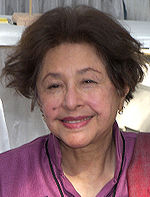 Distinguished international writer Bapsi Sidhwa lives in Houston Texas. Her novels: An American Brat, Cracking India, The Pakistani Bride, The Crow Eaters and Water have been published in several European and Asian languages. She has also compiled and edited Beloved City: Writings on Lahore [titled City of Sin and Splendor in India]. Among her many honors Sidhwa received the Bunting Fellowship at Radcliffe/Harvard, the Lila Wallace-Reader’s Digest Writer’s Award, the Sitara-i-Imtiaz, Pakistan’s highest national honor in the arts, and most recently the Italian Premio Mondello 2007 and the 2008 South Asian Excellence Award for Literature. Sidhwa, who was on the advisory committee to Prime Minister Benazir Bhutto on Women’s Development has taught at Columbia U, Mount Holyoke College, Brandeis, and Southampton University in England. Cracking India (a New York Times Notable Book of the Year and a Quality Paperback Book Club selection), was made into the film Earth by Canadian director Deepa Mehta. Her latest novel Water is based on Metha’s film of the same name. Her hugely successful play, An American Brat had a long run at Stages Repertory Theater in Houston last year.
Distinguished international writer Bapsi Sidhwa lives in Houston Texas. Her novels: An American Brat, Cracking India, The Pakistani Bride, The Crow Eaters and Water have been published in several European and Asian languages. She has also compiled and edited Beloved City: Writings on Lahore [titled City of Sin and Splendor in India]. Among her many honors Sidhwa received the Bunting Fellowship at Radcliffe/Harvard, the Lila Wallace-Reader’s Digest Writer’s Award, the Sitara-i-Imtiaz, Pakistan’s highest national honor in the arts, and most recently the Italian Premio Mondello 2007 and the 2008 South Asian Excellence Award for Literature. Sidhwa, who was on the advisory committee to Prime Minister Benazir Bhutto on Women’s Development has taught at Columbia U, Mount Holyoke College, Brandeis, and Southampton University in England. Cracking India (a New York Times Notable Book of the Year and a Quality Paperback Book Club selection), was made into the film Earth by Canadian director Deepa Mehta. Her latest novel Water is based on Metha’s film of the same name. Her hugely successful play, An American Brat had a long run at Stages Repertory Theater in Houston last year.
Author Interview
1. You are a prolific and renowned writer, having authored 5 books. How do you stay disciplined and what is your writing routine like?
Unfortunately I am not a disciplined writer and I don’t have a routine. I write when I have a chunk of time and I’m in the mood. Both are difficult to come by these days – too much in my life appears to interfere with the writing. When I’m working on a novel, and in its grip, I may write for hours at a stretch and not notice the time. I can stop writing for months when family needs require me to or or blithely give up when travel and holidays intervene; fortunately I can pick it up where I left off. Everything in my life – children, husband’s obligations, health matters – seems to have precedence over my writing. I find I can’t write in isolation – I need to have life around me – I think every author needs the sense of involvement.
2. The theme of partition strings together most of your work? Why is that subject so close to your heart? What is your own memory of the time?
The Partition of India was a defining moment in our history and it affected millions of lives for years in its aftermath – mine included. The Partition is central to the narrative in my third novel Cracking India. It makes a brief appearance in Pakistani Bride, and is barely mentioned in Crow Eaters. The roar of the mobs appeared to be a constant in my life; even as a 7 year old I knew it was an evil that threatened our lives. I couldn’t make out the words although I vaguely realized they were shouting religious slogans as they set fire to houses and harmed people. The memory of smoke and fire and fear and the sudden appearance of hoards of bedraggled refugees in my neighborhood are still vivid.
3. What has been the enjoyable part of your writing career? The awards, the fan base, and the people you have met along the way or something else?
The act of writing, of being immersed in a novel and knowing intuitively that it is unfolding as it should, this shifts me into a dimension of sustained transport, a high; it is like being in a constant state of meditation. Of course the awards are a much needed validation, and nothing validates an authors endeavors like the revelation of a fan-base. My readers and their remarks energize me. When they talk about my books I feel an intimacy, a very satisfying feeling of having shared myself with friends. I have met some wonderful writers along the way and made lasting friendships that I cherish.
4. Your path to publishing was not easy and riddled with hurdles. What advice would you give to a new writer?
You have to keep writing and trying to get published. It is a very frustrating process as I discovered. In Pakistan I self published The Crow Eaters before it was picked up by Jonathan Cape in England. If along the way you discover you are not a good writer, shift gears and go into a field which will give you more satisfaction.
5. What’s next for you? Are you working on a project that you would like to talk about?
I have a collection of essays almost readied and a collection of short stories that requires a spurt of physical and creative energy and creative.
Link to the author
Website
Mother’s Day Free Gift: A Taste of Saffron
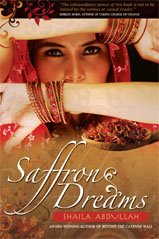 This mother’s day, pay your mother a loving tribute by giving her a gift of another mother’s ultimate love for her child. Saffron Dreams chronicles the journey of a dedicated mother and her everlasting bond with her special needs child. If you haven’t already, please get your copy of Saffron Dreams today. If you read the book and liked it, please drop me a line. I love hearing from readers.
This mother’s day, pay your mother a loving tribute by giving her a gift of another mother’s ultimate love for her child. Saffron Dreams chronicles the journey of a dedicated mother and her everlasting bond with her special needs child. If you haven’t already, please get your copy of Saffron Dreams today. If you read the book and liked it, please drop me a line. I love hearing from readers.
Read the reviews
View an excerpt
Watch a book video
Sign up for updates
Buy the Book
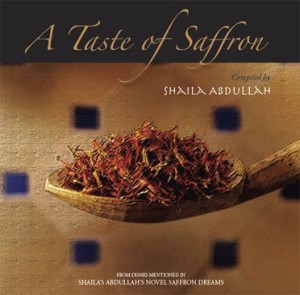 FREE GIFT:
FREE GIFT:
A Taste of Saffron is a collection of recipes of dishes mentioned in Saffron Dreams. To get the cookbook, simply send me an email with your favorite quote or scene from Saffron Dreams and I will send you the e-book absolutely free.
- « Previous Page
- 1
- …
- 5
- 6
- 7
- 8
- 9
- …
- 18
- Next Page »




